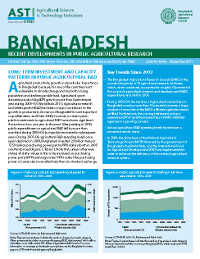Authors:
Rahija, Michael; Monir Hossain, Shah Md; Rahman, Md. Mustaizur; Stads, Gert-Jan
Year:
2011
Publisher
International Food Policy Research Institute (IFPRI); and Bangladesh Agricultural Research Council (BARC)
Back to:
Past investments in agricultural R&D have made a large contribution to Bangladesh’s rapid growth in agricultural output over time. However, fluctuation in annual agricultural R&D
spending levels in recent years may deserve attention, given the long time lag from the inception of research to the adoption of a new technology or the introduction of a new variety. In addition, unfilled vacancies at BARC-affiliated agencies, the imminent retirement of senior researchers as a result of an early (59 years) retirement age, and the exodus of more than 400 PhD researchers in the late 1990s and early 2000s are cause for urgent action. Moreover, a complex management structure creates structural difficulties that complicate BARC’s coordinating role.
NATP was initiated in 2009 to address the financial, human resource, and structural challenges facing agricultural R&D in Bangladesh. As part of NATP, a competitive grants fund has been established and BARC has put together a human resource development plan to implement during 2009–25. Furthermore, the BARC Act will strengthen BARC’s coordinating role by requiring BARC’s approval of research programs among all the BARC-affiliated agencies, as well giving BARC the responsibility of allocating financial resources among the agencies.
These changes have put Bangladesh’s agricultural R&D system on a path toward improvement. Its future is dependent upon the Bangladesh government’s continued (stable) investment in agricultural R&D, the provision of greater incentives to Bangladesh’s agricultural R&D staff, as well as a further increase in the retirement age of agricultural scientists.

